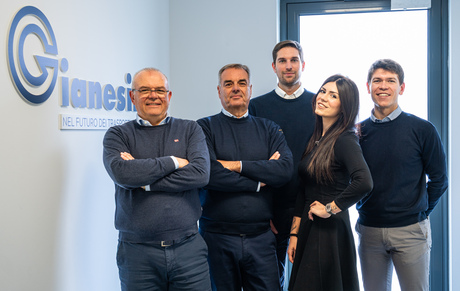Da oltre cent'anni connettiamo il mondo
Casa di spedizioni, trasporti nazionali e internazionali
I nostri
Trasporti
Trasporti via strada, mare e aereo che garantiscono flessibilità, precisione e affidabilità. Ogni soluzione è programmata su misura, per soddisfare le esigenze specifiche di ogni Cliente.
I nostri
Servizi
Offriamo una gamma completa di servizi per soddisfare appieno le vostre necessità nel trasporto internazionale. Dall’assistenza doganale ai trasporti fuori sagoma, garantiamo efficienza e il pieno rispetto delle normative, gestendo ogni operazione con cura e precisione.
Le nostre destinazioni
Scopri le nostre destinazioni e raggiungi ogni mercato con soluzioni su misura.
Le nostre aree di competenza
Settori serviti
Serviamo le più svariate realtà industriali, offrendo servizi di trasporto su misura per rispondere alle specifiche esigenze di ogni settore. Questi ambiti rappresentano le collaborazioni più frequenti per Gianesini, ma la nostra capacità operativa si estende ben oltre. Grazie alla nostra flessibilità, siamo in grado di adattarci con efficienza e affidabilità per servire anche altre industrie.

Industria cartaria
Industria dei macchinari e
impiantistica
Industria chimica
Industria petrolchimica e
plastica
Industria edile
Industria alimentare
Industria siderurgica
La storia della nostra famiglia
Chi siamo
Da più di un secolo, Gianesini connette il mondo con servizi di trasporto e spedizioni che da sempre mirano all’eccellenza. Siamo nati nel 1924 come una piccola impresa familiare, arrivando ad essere una delle maggiori realtà italiane nel settore.
Oggi, sempre sotto la guida della famiglia Gianesini, siamo giunti alla quarta generazione, gestendo più di 40.000 spedizioni all’anno e offrendo un'ampia gamma di servizi di trasporto su strada, via mare e via aerea, nell'ambito di diversi settori merceologici e in tutti i continenti.


100 anni di eccellenza
La nostra storia inizia nel 1924, quando Erminio Gianesini avviò un percorso che ha attraversato le generazioni e che continua ancora oggi.
I primi trasporti di persone, posta e merci iniziarono a Idria (all'epoca parte del territorio italiano), servendo le aree circostanti. Con il tempo, l'azienda ha ampliato il proprio raggio d'azione e si è evoluta nel settore delle merci, continuando a crescere.
Con il trasferimento a Gorizia nel 1940, abbiamo espanso la nostra presenza fino a servire destinazioni in tutto il mondo. Oggi, dopo un secolo, trasparenza, affidabilità e attenzione al cliente restano i nostri valori fondamentali.
+ 40000
spedizioni annue
819
clienti serviti nell'ultimo anno
167 +
paesi serviti nel mondo, raggiungendo tutti i paesi d'Europa
Blog
Un secolo di attività si traduce in esperienza, affidabilità e un vasto network di collaboratori.
Fedeli ai nostri valori di sempre - attenzione al cliente, solide partnership, rispetto per i nostri collaboratori e costante ricerca di nuove soluzioni - continuiamo a offrire prestazioni di altissimo livello.
Questi principi ci hanno guidato per 100 anni e continuano a essere la nostra forza distintiva.













